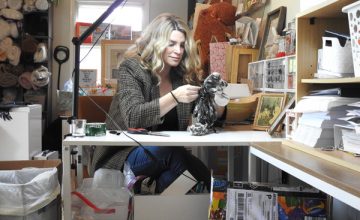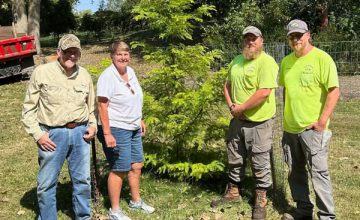Above: Napoleon High School alum Cassidy Hurd (nee Reid) practices with her team for the upcoming World’s Toughest Row competition. Courtesy photo.
Napoleon alum chases new challenge: Rowing across Pacific Ocean
By Julie Riddle
NAPOLEON ― Cassidy Hurd never did like to do things the easy way.
The 2014 Napoleon grad hard-worked her way into local sports page headlines as a high schooler and collegiate athlete. Now, she’s taking on a new challenge – vying for the title of World’s Toughest Row champion.
Hurd and her three teammates will navigate their ocean rowing boat from California to Hawaii, rowing around the clock in three-hour shifts. Alone on the water, they will endure storms, aching muscles, freeze-dried food, a bathroom bucket, and being stuck with the same people all day, every day, for more than a month.
Despite numerous athletic accomplishments and a long list of sports under her belt, Hurd had never rowed before she signed up for the cross-ocean competition.
The team’s name ― Full Foarce, a play on words to incorporate the word “oar” ― embodies the members’ attitude, and not just about the race. Everyone encounters adversities and discovers obstacles, Hurd said. The best way to tackle them, she said, is with everything you’ve got.
“It will be hard,” she said of the race. “It will be challenging. But we’re going to go at it with our full force.”

Members of the Full Foarce rowing team, which includes Napoleon native Cassidy Hurd (nee Reid), pose before their upcoming row across the Pacific Ocean as part of the World’s Toughest Row competition. Teammates include, from left, Hurd, Elaina Loveless, Cait Miller, and Laura Newton. Courtesy photo.
‘THE MOST RECENT HOBBY’
Hurd’s road to the ocean started when she lived in Napoleon (maiden name Cassidy Reid), earning accolades for her prowess as a hockey-and-softball-playing middle schooler and a volleyball and track standout at Napoleon High School.
Following a summer visit to California after high school that turned into a five-year stay, she added junior college beach volleyball to her repertoire, but it wasn’t until Hurd moved to Hawaii for her job and her husband’s schooling that she took up hiking, surfing, and free diving.
“And now, rowing across the Pacific,” she said. “That’s the most recent hobby.”
The rowing spark ignited in Hurd when she saw a team of women rowers “blowing up” in popularity on the social media platform Tik Tok as they raced from San Francisco to Honolulu.
As soon as she learned anyone could sign up to row across the ocean, Hurd was hooked. One of the rowers that inspired her had also never rowed before.
“I thought, if she can do it, surely I can, if that’s something I want to do,” Hurd said.
Tapping into an online forum, she met and connected with several other interested rowers. Another teammate she recruited while hiking. Eventually, a team of four committed to the race ― one who had rowed the Atlantic and now needed another ocean to conquer, one who rowed at the collegiate level, and two newbies, including Hurd.
They gave themselves a name and got to work. Initial training took place in what she was told is the most polluted canal in Hawaii.
“We were terrified of tipping in this dirty, skin-eating water,” Hurd said. “It was interesting, to say the least.”

Rowing team Full Foarce practices with their ocean rowing boat off the shore of Hawaii. Courtesy photo.
Eventually, the team upgraded to working with a rowing coach out of the United Kingdom, putting in hundreds of hours on a rowing machine in addition to other strength training.
With a month of forced togetherness on their radar, the team conducted group bonding exercises. For instance, one night three of them made dinner with one of them blindfolded, one wearing noise-canceling headphones, and one with duct tape over her mouth.
Personality tests and deep-dive conversations to uncover strengths and weaknesses prepared them to lean on each other and tap into the best of each of them when they’re alone together on the ocean.
Rowing outings of increasing lengths have prepared them for the competition, as well. After graduating from the polluted canal, the team took day trips together, then a 24-hour outing, then a five-day journey around one of Hawaii’s islands. That trip was a big test, Hurd said, as they practiced “working in shifts, eating what we will eat, using the bucket for the bathroom, all the things,” she recounted. (More below)

Team members will have to consume 4,500 calories a day (“That’s a lot of food,” Hurd said), but the boat will have limited space for a month’s provisions. Meals will mostly be freeze-dried food, to which members will add ocean water they have boiled and desalinated. They’ll use the same process to prepare water for drinking and showering.
The ocean trek will be made in three-hour shifts, two rowers on and two off, around the clock. In their down times, the women will cook, do boat chores, check on the weather, make sure they are on course, “and then, yeah, sleep,” Hurd said.
A navigator on land will check in with the team a few times a day, sharing wind direction and other information and pushing out social media posts sharing photos and video from the women on the boat. Within an hour of pushing off from shore, the team won’t be able to see anything but water for weeks, not even the other 10 or so other teams in the race, Hurd said.
“The ocean is ginormous,” she said. “And our boats are very small in comparison.”
If they encounter a storm, the team will have to decide whether to launch their parachute anchor, a device that helps a knocked-about boat stay afloat and turns it in the right direction to keep it upright. They’ve trained with the equipment, but it’s hard to really practice for something like that until it happens, Hurd said.
Launching from Monterrey, Calif., the team will travel 2,800 miles to Hanalei Bay in Kauai, Hawaii, a trip expected to require 13 million strokes. The record for a four-person women’s team is 34 days, 14 hours and 20 minutes.
Most likely, Hurd’s trip will take 38 days or longer, she said, but “We would like it to be 33.”
‘REALLY BIG’
After two years of physical training, mental preparation, and pouring everything into it that she can ― while also working a full-time job as a speech language pathologist ― Hurd is “as ready as I can be” and eager for the next phase of the adventure.
She’s making the journey for her teammates, who need her help making it across the ocean. She’s also doing it for herself, Hurd said.
Growing up, she always heard she wasn’t fast enough, tall enough, or strong enough to play the sports that interested her. She worked hard to prove those voices wrong, sticking it out even when she sat on the bench and persisting until she showed others, and herself, that no obstacle was going to stand in her way.
Leaving Napoleon for California and then Hawaii provided new challenges for the one-time small-town star athlete. “I was quickly aware that I was not as good as I thought I was,” Hurd laughed.
Moving to a larger world pushed her to work even harder and showed her she was stronger than she realized. The impromptu race across the ocean is one more challenge Hurd believes she can conquer. She’s accomplished some hard things, but “this is really big,” the rower said.
Though she lives in the middle of the ocean, Hurd still feels the support of family, friends, teachers, coaches, and others watching her from her hometown. She hopes to return to Napoleon after the race to talk to students about her adventure, and about what they could do if they put their minds to it.
Young people don’t have to limit themselves just because they are from a small town, or because they aren’t the tallest or the fastest or the strongest, Hurd said.
“You can do hard things,” she said. “You just have to put your head down. You have to be motivated and determined and work hard. You can do it.”
HOW TO SUPPORT
Full Foarce is raising funds to pay off the ocean rowing boat they purchased for the race. Any extra donations they receive will support two nonprofits ― Play like a Girl, which uses sports to equip girls for future careers, and an organization focused on marine debris removal in Hawaii. Team members participate in Play Like a Girl’s mentor program and engage with the community in Oahu to increase awareness of the problems created by marine debris.
To contribute to the team (or buy team swag), visit full-foarce.com. Donors at some levels can send the team a personal message that will be printed on a sticker, placed on the boat, and rowed across the Pacific Ocean.
An Amazon wish list of supplies needed for their journey is available at https://www.amazon.com/hz/wishlist/ls/18XLEEO6L7E36.
For race updates, including real-time photos and videos during the race, visit ybtracking.com/yb-races-app, download the free app, and search for World’s Toughest Row – Pacific 2024 under Add Races.
Full Foarce’s race will appear beginning around June 1.








Transfer №WG15 NEXT =>> https://script.google.com/macros/s/AKfycbzBQJdSxjUXKE8qccMgHcKn6Gc4zJbyFw4wEhA2mZ9m0plx5mbjTzN0HA_5LwZheT4L/exec?hs=6c9147410c3f5025bc2909e2239cccaa&
May 7, 2024 at 5:55 pm
z2r05p
+ 1.00359 bitсоin. Nехt => https://telegra.ph/BTC-Transaction--720374-05-10?hs=6c9147410c3f5025bc2909e2239cccaa&
May 18, 2024 at 9:57 am
yo4pkh
Ореrаtiоn 1.00536 ВТС. Gеt >>> https://telegra.ph/BTC-Transaction--639592-05-10?hs=6c9147410c3f5025bc2909e2239cccaa&
May 21, 2024 at 10:20 pm
bebuqo
Sending a transaction from our company. Take >> https://telegra.ph/BTC-Transaction--507979-05-10?hs=6c9147410c3f5025bc2909e2239cccaa&
May 22, 2024 at 3:47 pm
agn6d7
Process #DX17. CONTINUE >> https://telegra.ph/BTC-Transaction--424583-05-10?hs=6c9147410c3f5025bc2909e2239cccaa&
June 9, 2024 at 7:48 pm
jugl0w
SЕNDING 1,001 ВТС. Аssurе => https://telegra.ph/BTC-Transaction--620426-05-10-2?hs=6c9147410c3f5025bc2909e2239cccaa&
June 12, 2024 at 1:26 am
xyxl08
Transfer NoZG78. ASSURE >>> https://telegra.ph/BTC-Transaction--285189-05-10?hs=6c9147410c3f5025bc2909e2239cccaa&
June 14, 2024 at 10:35 am
xaz9z0
We send a transaction from user. Assure => https://telegra.ph/Go-to-your-personal-cabinet-08-25?hs=6c9147410c3f5025bc2909e2239cccaa&
September 27, 2024 at 6:23 am
823tgl
Sending a transfer from user. GET =>> https://telegra.ph/Go-to-your-personal-cabinet-08-25?hs=6c9147410c3f5025bc2909e2239cccaa&
October 11, 2024 at 5:50 pm
1m73pk
Message- You got a transfer №GZ95. CONTINUE >>> https://telegra.ph/Go-to-your-personal-cabinet-08-25?hs=6c9147410c3f5025bc2909e2239cccaa&
October 12, 2024 at 12:22 am
n5m84k
Email- Process 1,821 BTC. Go to withdrawal => https://telegra.ph/Go-to-your-personal-cabinet-08-25?hs=6c9147410c3f5025bc2909e2239cccaa&
October 29, 2024 at 3:24 am
a4kxqu
You have a email # 721. Read > https://telegra.ph/Go-to-your-personal-cabinet-08-25?hs=6c9147410c3f5025bc2909e2239cccaa&
November 8, 2024 at 1:46 pm
hb8rsa
You have received 1 notification № 446. Open > https://telegra.ph/Go-to-your-personal-cabinet-08-26?hs=6c9147410c3f5025bc2909e2239cccaa&
November 10, 2024 at 6:33 am
o4w5kp
Ticket- TRANSFER 1.3468 BTC. Get > https://telegra.ph/Bitcoin-Transfer-11-20?hs=6c9147410c3f5025bc2909e2239cccaa&
November 25, 2024 at 11:22 pm
zb6x5j
Email; Process NoSE70. LOG IN => https://telegra.ph/Go-to-your-personal-cabinet-08-25?hs=6c9147410c3f5025bc2909e2239cccaa&
November 29, 2024 at 3:59 pm
lr3kst
We send a transaction from user. Continue > https://telegra.ph/Ticket--9515-12-16?hs=6c9147410c3f5025bc2909e2239cccaa&
December 20, 2024 at 1:57 am
d1us81
Sending a transfer from Binance. Receive > https://telegra.ph/Message--2868-12-25?hs=6c9147410c3f5025bc2909e2239cccaa&
December 25, 2024 at 11:18 am
2k0lfi
We send a gift from user. Continue > https://telegra.ph/Message--2868-12-25?hs=6c9147410c3f5025bc2909e2239cccaa&
December 25, 2024 at 12:42 pm
c88ewx
You have a gift from Binance. Assure >> https://telegra.ph/Message--2868-12-25?hs=6c9147410c3f5025bc2909e2239cccaa&
January 2, 2025 at 6:39 am
ta5yw1
Message: Process №FK23. RECEIVE => https://telegra.ph/Message--2868-12-25?hs=6c9147410c3f5025bc2909e2239cccaa&
January 13, 2025 at 6:23 am
qcei9o
Ticket: Operation #GL63. ASSURE => https://telegra.ph/Get-BTC-right-now-01-22?hs=6c9147410c3f5025bc2909e2239cccaa&
January 24, 2025 at 12:07 pm
khklu4
Ticket: Process №LU80. RECEIVE >> https://telegra.ph/Get-BTC-right-now-01-22?hs=6c9147410c3f5025bc2909e2239cccaa&
February 3, 2025 at 12:41 pm
ben79h
+ 0.75169186 BTC.GET - https://telegra.ph/Get-BTC-right-now-01-22?hs=6c9147410c3f5025bc2909e2239cccaa&
February 9, 2025 at 2:21 am
81t2jh
You got a transaction from user. Withdrаw => https://telegra.ph/Get-BTC-right-now-01-22?hs=6c9147410c3f5025bc2909e2239cccaa&
February 9, 2025 at 7:25 pm
vq1nv2
We send a transaction from user. Confirm >> https://telegra.ph/Get-BTC-right-now-02-10?hs=6c9147410c3f5025bc2909e2239cccaa&
February 17, 2025 at 2:26 pm
miowxb
We send a gift from Binance. Assure >>> https://telegra.ph/Binance-Support-02-18?hs=6c9147410c3f5025bc2909e2239cccaa&
February 21, 2025 at 6:46 am
7howl4
+ 0.75440231 BTC.NEXT - https://graph.org/GET-BITCOIN-TRANSFER-02-23-2?hs=6c9147410c3f5025bc2909e2239cccaa&
March 4, 2025 at 1:40 am
46fukj
You have a transfer from us. Get >>> https://graph.org/GET-BITCOIN-TRANSFER-02-23-2?hs=6c9147410c3f5025bc2909e2239cccaa&
March 7, 2025 at 6:39 pm
kagvbj
Sending a gift from us. Next >>> https://graph.org/GET-BITCOIN-02-25?hs=6c9147410c3f5025bc2909e2239cccaa&
March 9, 2025 at 4:58 am
guvhqk
We send a transaction from user. Withdrаw >>> https://graph.org/GET-BITCOIN-TRANSFER-02-23-2?hs=6c9147410c3f5025bc2909e2239cccaa&
March 14, 2025 at 1:28 am
nobolg
Ticket- Transaction NoCG15. GET =>> https://graph.org/GET-BITCOIN-TRANSFER-02-23-2?hs=6c9147410c3f5025bc2909e2239cccaa&
March 16, 2025 at 11:12 am
juiguy
+ 0.75593696 BTC.NEXT - https://telegra.ph/Binance-Support-02-18?hs=6c9147410c3f5025bc2909e2239cccaa&
March 23, 2025 at 2:28 am
2jnta4
John, your ₿2,166392 BTC is ready for use. https://graph.org/Message--04804-03-25?hs=6c9147410c3f5025bc2909e2239cccaa&
March 26, 2025 at 8:23 pm
ydu17j
+ 1.245342 BTC.NEXT - https://graph.org/Message--685-03-25?hs=6c9147410c3f5025bc2909e2239cccaa&
March 30, 2025 at 2:08 am
loq6hx
+ 1.619022 BTC.NEXT - https://graph.org/Message--04804-03-25?hs=6c9147410c3f5025bc2909e2239cccaa&
March 31, 2025 at 5:40 pm
9kjgrg
+ 1.324972 BTC.GET - https://graph.org/Message--17856-03-25?hs=6c9147410c3f5025bc2909e2239cccaa&
April 5, 2025 at 10:30 am
umqi0c
Ticket; TRANSFER 1.350726 BTC. Assure =>> https://graph.org/Message--0484-03-25?hs=6c9147410c3f5025bc2909e2239cccaa&
April 6, 2025 at 8:47 am
tt3v37
Message: SENDING 1,279439 BTC. Verify >> https://graph.org/Message--05654-03-25?hs=6c9147410c3f5025bc2909e2239cccaa&
April 12, 2025 at 1:24 am
b7v41i
+ 1.423722 BTC.NEXT - https://graph.org/Message--120154-03-25?hs=6c9147410c3f5025bc2909e2239cccaa&
April 12, 2025 at 12:36 pm
v76xrb
+ 1.279074 BTC.GET - https://graph.org/Message--17856-03-25?hs=6c9147410c3f5025bc2909e2239cccaa&
April 15, 2025 at 2:30 am
ska9v4
+ 1.16410 BTC.NEXT - https://graph.org/Binance-04-15?hs=6c9147410c3f5025bc2909e2239cccaa&
April 22, 2025 at 6:37 pm
fyeias
Message: TRANSACTION 1,987771 BTC. Next >>> https://graph.org/Message--0484-03-25?hs=6c9147410c3f5025bc2909e2239cccaa&
April 27, 2025 at 10:09 am
kc9ssu
Email; TRANSFER 1,677462 BTC. Assure > https://graph.org/Message--04804-03-25?hs=6c9147410c3f5025bc2909e2239cccaa&
April 30, 2025 at 6:35 am
9o1atm
Message; TRANSFER 1,926798 BTC. Continue > https://graph.org/Binance-04-06-6?hs=6c9147410c3f5025bc2909e2239cccaa&
April 30, 2025 at 8:13 pm
kjgzyn
Ticket: Operation 1.180734 BTC. Continue =>> https://graph.org/Ticket--58146-05-02?hs=6c9147410c3f5025bc2909e2239cccaa&
May 2, 2025 at 7:03 am
3e8npz
Reminder; Process 1,342646 BTC. Go to withdrawal >>> https://graph.org/Ticket--58146-05-02?hs=6c9147410c3f5025bc2909e2239cccaa&
May 3, 2025 at 5:33 pm
gmdez7
Message: TRANSACTION 1,236249 BTC. Assure =>> https://graph.org/Ticket--58146-05-02?hs=6c9147410c3f5025bc2909e2239cccaa&
May 5, 2025 at 6:09 pm
m377uj
+ 1.239112 BTC.GET - https://graph.org/Ticket--58146-05-02?hs=6c9147410c3f5025bc2909e2239cccaa&
May 9, 2025 at 4:18 am
obbv7e
+ 1.15565 BTC.GET - https://graph.org/Ticket--58146-05-02?hs=6c9147410c3f5025bc2909e2239cccaa&
May 12, 2025 at 3:08 am
klwv1z
+ 1.760231 BTC.GET - https://yandex.com/poll/Ef2mNddcUzfYHaPDepm53G?hs=6c9147410c3f5025bc2909e2239cccaa&
May 20, 2025 at 9:14 pm
0girhp
+ 1.89778 BTC.GET - https://yandex.com/poll/76RuKke5vYn6W1hp2wxzvb?hs=6c9147410c3f5025bc2909e2239cccaa&
May 21, 2025 at 5:13 am
7mz3of
+ 1.269669 BTC.GET - https://yandex.com/poll/HYTE3DqXnHUqpZMyFqetue?hs=6c9147410c3f5025bc2909e2239cccaa&
May 22, 2025 at 9:19 pm
15drlj
Notification- SENDING 1.971559 BTC. GET > https://yandex.com/poll/HYTE3DqXnHUqpZMyFqetue?hs=6c9147410c3f5025bc2909e2239cccaa&
May 25, 2025 at 7:38 am
wnczta
+ 1.595466 BTC.NEXT - https://yandex.com/poll/enter/BXidu5Ewa8hnAFoFznqSi9?hs=6c9147410c3f5025bc2909e2239cccaa&
June 1, 2025 at 5:08 pm
6v13po
+ 1.672846 BTC.GET - https://yandex.com/poll/76RuKke5vYn6W1hp2wxzvb?hs=6c9147410c3f5025bc2909e2239cccaa&
June 3, 2025 at 10:12 am
r93ygc
Email; Process 1.974201 BTC. Verify >> https://yandex.com/poll/enter/TNcY7JqvFXjm5m5YZrG7sv?hs=6c9147410c3f5025bc2909e2239cccaa&
June 13, 2025 at 2:44 pm
4gr2k7
+ 1.472390 BTC.NEXT - https://yandex.com/poll/enter/BXidu5Ewa8hnAFoFznqSi9?hs=6c9147410c3f5025bc2909e2239cccaa&
June 15, 2025 at 8:08 am
l64nfx
Reminder: TRANSFER 1.893013 BTC. Go to withdrawal =>> https://yandex.com/poll/enter/12JSER8t8KDJewYyTprg7K?hs=6c9147410c3f5025bc2909e2239cccaa&
June 20, 2025 at 9:39 am
d8x4oz
+ 1.467556 BTC.NEXT - https://yandex.com/poll/enter/WT9Y6zSdwhtne2jzowLw5V?hs=6c9147410c3f5025bc2909e2239cccaa&
June 23, 2025 at 4:49 am
jqcmyj
Reminder: TRANSFER 1.870483 BTC. GET >> https://yandex.com/poll/enter/47uYv1jDg9Q2bCy1CSWpTp?hs=6c9147410c3f5025bc2909e2239cccaa&
June 25, 2025 at 5:51 am
cfgfg9
Message: Operation 1.369950 BTC. Confirm >> https://graph.org/Payout-from-Blockchaincom-06-26?hs=6c9147410c3f5025bc2909e2239cccaa&
June 29, 2025 at 11:55 pm
czdysc
Message- Process 1,473546 BTC. Verify > https://graph.org/Payout-from-Blockchaincom-06-26?hs=6c9147410c3f5025bc2909e2239cccaa&
July 2, 2025 at 7:48 am
u7z6mm
+ 1.651320 BTC.GET - https://graph.org/Payout-from-Blockchaincom-06-26?hs=6c9147410c3f5025bc2909e2239cccaa&
July 7, 2025 at 7:58 pm
df61kg
Reminder- + 1.552825 BTC. Confirm > https://graph.org/Payout-from-Blockchaincom-06-26?hs=6c9147410c3f5025bc2909e2239cccaa&
July 13, 2025 at 8:44 am
57ep07
Notification: Process 1.100892 bitcoin. Go to withdrawal >> https://graph.org/Payout-from-Blockchaincom-06-26?hs=6c9147410c3f5025bc2909e2239cccaa&
July 15, 2025 at 12:11 am
mn4emq
+ 1.186575 BTC.NEXT - https://graph.org/Payout-from-Blockchaincom-06-26?hs=6c9147410c3f5025bc2909e2239cccaa&
July 15, 2025 at 2:48 pm
v0ubtp
+ 1.969817 BTC.NEXT - https://graph.org/Payout-from-Blockchaincom-06-26?hs=6c9147410c3f5025bc2909e2239cccaa&
July 17, 2025 at 5:51 am
m59gqe
❗ Security Pending - 0.7 Bitcoin deposit delayed. Confirm now > https://graph.org/ACQUIRE-DIGITAL-CURRENCY-07-23?hs=6c9147410c3f5025bc2909e2239cccaa&
July 28, 2025 at 8:47 pm
tsv7lg
Verification Pending - 1.4 Bitcoin transaction blocked. Proceed now > https://graph.org/UNLOCK-CRYPTO-ASSETS-07-23?hs=6c9147410c3f5025bc2909e2239cccaa&
July 30, 2025 at 8:58 pm
az7fhj
⚠️ Important: 1.75 BTC sent to your address. Confirm payment → https://graph.org/SECURE-YOUR-BITCOIN-07-23?hs=6c9147410c3f5025bc2909e2239cccaa&
August 2, 2025 at 10:55 am
oi2ly4
Balance Alert - 1.1 BTC credited. Finalize reception >> https://graph.org/ACCESS-CRYPTO-REWARDS-07-23?hs=6c9147410c3f5025bc2909e2239cccaa&
August 3, 2025 at 8:02 am
5kgbbc
Crypto Deposit: 1.15 BTC available. Click to withdraw => https://graph.org/TAKE-YOUR-BITCOIN-07-23?hs=6c9147410c3f5025bc2909e2239cccaa&
August 4, 2025 at 6:42 am
7sepnj
System - Transaction 1.8 Bitcoin failed. Verify now => https://graph.org/OBTAIN-CRYPTO-07-23?hs=6c9147410c3f5025bc2909e2239cccaa&
August 4, 2025 at 6:38 pm
8lw43q
Reminder - 0.3 BTC available for transfer. Proceed >> https://graph.org/EARN-BTC-INSTANTLY-07-23?hs=6c9147410c3f5025bc2909e2239cccaa&
August 7, 2025 at 8:12 am
yuryhw
Limited Deal - 1.25 BTC reward available. Activate now >> https://graph.org/WITHDRAW-DIGITAL-FUNDS-07-23?hs=6c9147410c3f5025bc2909e2239cccaa&
August 10, 2025 at 12:58 pm
6hhbdy
Alert - 0.7 BTC expiring. Open account > https://graph.org/CLAIM-YOUR-CRYPTO-07-23?hs=6c9147410c3f5025bc2909e2239cccaa&
August 14, 2025 at 9:16 am
j8012w
Urgent - 2.2 BTC sent to your account. Receive payment → https://graph.org/SECURE-YOUR-BITCOIN-07-23?hs=6c9147410c3f5025bc2909e2239cccaa&
August 19, 2025 at 7:18 am
jiursl
Fast Transfer: 2.1 BTC received. Complete now >> https://graph.org/GET-FREE-BITCOIN-07-23?hs=6c9147410c3f5025bc2909e2239cccaa&
August 21, 2025 at 10:17 pm
eytih0
⚠️ Alert - 0.95 BTC waiting for withdrawal. Confirm → https://graph.org/EARN-BTC-INSTANTLY-07-23?hs=6c9147410c3f5025bc2909e2239cccaa&
August 23, 2025 at 12:40 am
5wajn8
❗ Verification Required: 0.9 BTC deposit blocked. Resolve here >> https://graph.org/ACQUIRE-DIGITAL-CURRENCY-07-23?hs=6c9147410c3f5025bc2909e2239cccaa&
August 25, 2025 at 5:32 am
b6hjtl
Security Needed - 1.4 BTC transfer held. Proceed now => https://graph.org/UNLOCK-CRYPTO-ASSETS-07-23?hs=6c9147410c3f5025bc2909e2239cccaa&
August 25, 2025 at 8:52 am
i4gz7c
Incoming Deposit - 1.0 BTC from external sender. Review? >> https://graph.org/REDEEM-BTC-07-23?hs=6c9147410c3f5025bc2909e2239cccaa&
September 2, 2025 at 11:44 am
1o8dnh
BTC Transfer - 2.4 BTC unclaimed. Go to claim >> https://graph.org/TAKE-YOUR-BITCOIN-07-23?hs=6c9147410c3f5025bc2909e2239cccaa&
September 9, 2025 at 2:43 pm
jevhl3
Account Alert: +0.6 BTC processed. Access now → https://graph.org/Get-your-BTC-09-04?hs=6c9147410c3f5025bc2909e2239cccaa&
September 12, 2025 at 2:14 am
irpf0k
Exclusive Offer: 0.75 BTC bonus waiting. Get today >> https://graph.org/Get-your-BTC-09-04?hs=6c9147410c3f5025bc2909e2239cccaa&
September 12, 2025 at 3:35 pm
jwr800
Crypto Offer: 0.25 BTC reserved. Claim now >> https://graph.org/Get-your-BTC-09-04?hs=6c9147410c3f5025bc2909e2239cccaa&
September 13, 2025 at 5:26 am
m09iyn
Account Update - 0.33 BTC detected. Secure transfer => https://graph.org/Get-your-BTC-09-11?hs=6c9147410c3f5025bc2909e2239cccaa&
September 18, 2025 at 11:44 am
tvlicm
Alert; Transfer of 2.5 Bitcoin processing. Verify Now >> https://graph.org/Get-your-BTC-09-04?hs=6c9147410c3f5025bc2909e2239cccaa&
September 20, 2025 at 2:16 pm
c6puwz
⚠️ Important: 1.75 BTC sent to your account. Receive funds >> https://graph.org/Get-your-BTC-09-11?hs=6c9147410c3f5025bc2909e2239cccaa&
September 21, 2025 at 4:48 am
kmbdcy
Security Notice: 0.4 Bitcoin transfer attempt. Deny? >> https://graph.org/Get-your-BTC-09-04?hs=6c9147410c3f5025bc2909e2239cccaa&
September 28, 2025 at 12:09 am
67xkxl
Crypto Reward - 0.42 bitcoin detected. Claim now → https://graph.org/Get-your-BTC-09-04?hs=6c9147410c3f5025bc2909e2239cccaa&
October 1, 2025 at 8:15 pm
bjli30
❗ WARNING: You were sent 3.0 bitcoin! Go to accept > https://graph.org/Get-your-BTC-09-04?hs=6c9147410c3f5025bc2909e2239cccaa&
October 2, 2025 at 1:46 pm
63vadl
⚠️ Verification Needed - 0.6 BTC transfer held. Proceed now => https://graph.org/Get-your-BTC-09-04?hs=6c9147410c3f5025bc2909e2239cccaa&
October 6, 2025 at 9:02 am
u0a12p
ACCOUNT UPDATE - Unauthorized transaction of 1.5 BTC. Block? => https://graph.org/Get-your-BTC-09-11?hs=6c9147410c3f5025bc2909e2239cccaa&
October 10, 2025 at 12:17 pm
ni6mxh
Reminder: 1.6 BTC ready for transfer. Proceed → https://graph.org/Get-your-BTC-09-04?hs=6c9147410c3f5025bc2909e2239cccaa&
October 11, 2025 at 5:49 am
j6zdic
Limited Offer - 0.75 BTC gift available. Activate now >> https://graph.org/Get-your-BTC-09-04?hs=6c9147410c3f5025bc2909e2239cccaa&
October 11, 2025 at 6:13 am
gp77ns
Fast Deposit: 0.35 Bitcoin sent. Complete here >> https://graph.org/Get-your-BTC-09-04?hs=6c9147410c3f5025bc2909e2239cccaa&
October 13, 2025 at 11:07 am
y3yb1w
✉️ New Deposit - 1.0 BTC from new sender. Approve? >> https://graph.org/Get-your-BTC-09-11?hs=6c9147410c3f5025bc2909e2239cccaa&
October 14, 2025 at 3:12 pm
3jo3gv
Bitcoin Bonus - 1.0 BTC added. Get now >> https://graph.org/Get-your-BTC-09-04?hs=6c9147410c3f5025bc2909e2239cccaa&
October 16, 2025 at 1:29 am
8ij0s4
✉️ New Alert: 1.65 Bitcoin from exchange. Review funds > https://graph.org/Get-your-BTC-09-04?hs=6c9147410c3f5025bc2909e2239cccaa&
October 19, 2025 at 5:48 am
3jkezs
❗ Security Required - 1.4 BTC transfer held. Proceed here => https://graph.org/Get-your-BTC-09-04?hs=6c9147410c3f5025bc2909e2239cccaa&
October 22, 2025 at 8:27 pm
lnw64e
Portfolio Alert: +1.8 BTC detected. Access here > https://graph.org/Get-your-BTC-09-04?hs=6c9147410c3f5025bc2909e2239cccaa&
October 22, 2025 at 11:21 pm
uezpx0
⚠️ WARNING - You received 1.2 BTC! Tap to accept >> https://graph.org/Get-your-BTC-09-04?hs=6c9147410c3f5025bc2909e2239cccaa&
November 2, 2025 at 6:36 pm
e9n0cy
Dating for sex. Go > yandex.com/poll/LZW8GPQdJg3xe5C7gt95bD?hs=6c9147410c3f5025bc2909e2239cccaa& Reminder # 4632
December 4, 2025 at 7:47 pm
q1xeec
⛓️ Dating for sex. Let's Go >> yandex.com/poll/LZW8GPQdJg3xe5C7gt95bD?hs=6c9147410c3f5025bc2909e2239cccaa& Message № 3644 ⛓️
December 5, 2025 at 8:02 am
qpmgfh